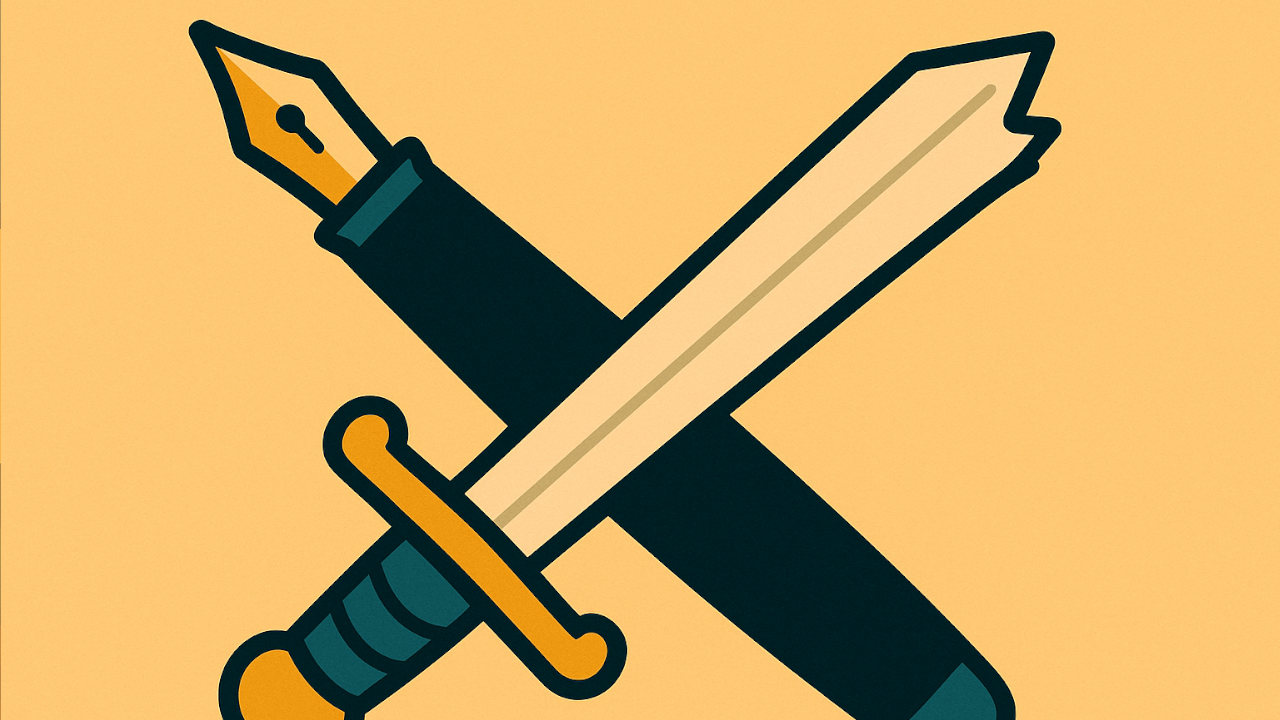How to Read “ペンは剣よりも強し”
pen wa ken yori mo tsuyoshi
Meaning of “ペンは剣よりも強し”
“Pen is stronger than sword” means that the influence of writing and speech is stronger and more enduring than rule by force.
The “pen” here is not merely a writing instrument, but symbolizes the entire act of writing—that is, putting thoughts, knowledge, and information into written form to convey them. The “sword,” on the other hand, represents force and violent means. This proverb teaches that while force may achieve temporary victory, ultimately it is superior ideas and righteous speech that truly have the power to move people’s hearts and change society.
It is commonly used when explaining the importance of freedom of speech or when emphasizing the value of non-violent solutions. It is also frequently quoted by educators, journalists, and writers when discussing the significance of their work. In modern times, it is often used in contexts discussing the power of information dissemination and the importance of education.
Origin and Etymology
“Pen is stronger than sword” is not actually an ancient Japanese proverb. It originates from the line “The pen is mightier than the sword” in the play “Richelieu” published in 1839 by 19th-century British novelist Edward Bulwer-Lytton.
The political situation in Europe at the time was deeply involved in the background of this famous quote. Richelieu was a 17th-century French chief minister who governed the country through diplomacy and political skill rather than force. Bulwer-Lytton had this historical figure express the philosophy that “the influence of intelligence and writing is more enduring and powerful than rule by force.”
It was introduced to Japan during the Meiji period along with the influx of Western culture and became established as “Pen is stronger than sword.” Japan at that time was at a turning point, transitioning from the age of samurai to the age of civilization and enlightenment, and this phrase was accepted by many intellectuals as symbolizing the values of the new era. The historical context of the developing media such as newspapers and magazines is thought to have supported the spread of this phrase.
Usage Examples
- Working as a journalist, she approaches investigative reporting with the belief that pen is stronger than sword
- When I was about to become emotional in a debate with a politician, I calmly countered with the spirit of pen is stronger than sword
Modern Interpretation
In modern society, “Pen is stronger than sword” has taken on more complex and multifaceted meanings. This is because the spread of the internet and social media has created an era where anyone can wield a “pen.”
However, this democratization has also created new challenges. Phenomena such as fake news, defamation, and online harassment show that “the power of the pen” is not necessarily used constructively. In modern times, precisely because “pen is stronger than sword,” the responsibility is also heavy.
Moreover, the “pen” of the digital age takes various forms beyond traditional writing, including video, images, and audio. The influence that YouTubers and influencers have on society can truly be called the modern version of “the power of the pen.” A single post from them can move corporate stock prices or raise awareness of social issues.
At the same time, however, concerns are growing about speech control by authoritarian regimes and information manipulation by giant IT companies. The phenomenon of those who hold the “sword” trying to control the “pen” complicates the simple oppositional structure that this proverb assumed.
In modern times, this proverb is acquiring new meaning as words that make us think about the importance of information literacy and responsibility as communicators.
When AI Hears This
When Bulwer-Lytton wrote these words in 1839, it took months for a single book to be printed and spread nationwide. Today, however, a single tweet can go viral within hours, toppling governments or crashing stock markets. This “exponential increase in information transmission speed” is precisely what has transformed the pen into a weapon far more dangerous and powerful than the sword.
The 19th-century “pen” was constrained by the physical limitations of letterpress printing, creating a time buffer for information dissemination. There was time to notice mistakes and make corrections, room for counterarguments. But today’s “digital pen” spreads instantly across the globe, making information nearly impossible to retract once released.
Even more fascinating is the emergence of AI-generated content. Now the “pen” can move automatically without human writers, producing information 24/7. This phenomenon was unimaginable in the 19th century—we’ve truly entered an era where “the pen thinks and writes by itself.”
A sword can only harm one person at a time, but today’s pen can instantly change the perceptions of millions and shake entire social systems. With technological innovation making the “pen’s range” infinite, the true terror of this adage has become reality.
Lessons for Today
“Pen is stronger than sword” teaches us what true strength is. Precisely because we live in an age where anyone can be a communicator through social media, this old maxim shines with new light.
The words you speak daily, the sentences you write, and the information you share have greater power than you think. They can sometimes become swords that hurt people, or warm light that encourages them. What’s important is having the awareness to use that power constructively.
Propose rather than criticize, try to understand rather than attack, promote dialogue rather than division. By being mindful of such “ways of using the pen,” the world around you will gradually change.
Also, precisely because we live in an information-saturated modern age, the value of high-quality “pens” has increased even more. Sentences that are deeply considered, carefully researched, and written from the other person’s perspective will surely reach people’s hearts even amid the noise. Your sincere words hold the potential to change someone’s life.
When each person wields a responsible “pen,” society moves in a better direction. That is the modern hope of this proverb.



Comments